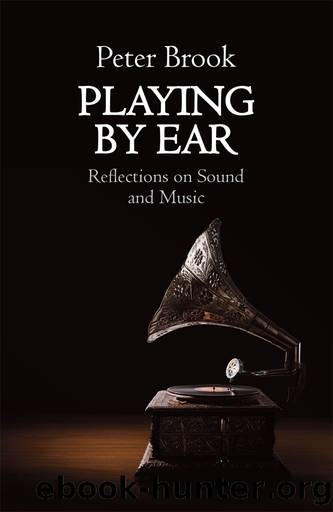Playing by Ear by Peter Brook

Author:Peter Brook [Brook, Peter]
Language: eng
Format: epub
ISBN: 9781788502542
Publisher: Nick Hern Books
Published: 0101-01-01T00:00:00+00:00
There are countless ways of understanding the word âharmonyâ, but in every form of music there is a basic understanding that some vibrations can come together and make one sound in which two become one.
Near to home, in Western music, we find the duetâon the opera stage or in the moment of marriage between two instruments, often piano and violin. Our emotions respond immediately to the pleasures of harmony penetrating and transforming discord. The supreme goalâas in every spiritual wayâis unity. The duet can very naturally become a trio and then a quartet. It is as though human manifestations are ruled by a law of numbers. Two, three, fourâthe sequence in itself is harmonious. Every string quartet is an expression of the wondrous capacity of the ego willingly to give itself over to something greater than itself. In the best quartets, one thinking, one listening, carries the passage from violins to viola, viola to cello, cello to double bass, all four intertwining freely.
The instruments can change; a clarinet, an oboe, a voice, voices can all take over. But nine instruments is the limitâwith the sole exception of the uncanny, lightning speed of movement, of shared thought and intention of some very ancient Eastern traditions of drumming. In every case, the secret is listening.
We never know who may be listening. During the war, posters warned us that âcareless talk costs livesâ, and in every totalitarian country you live with the danger of being overheard everywhere. Once, in Soviet days on a visit to Prague, I had an appointment in my hotel with a young woman interested in our work. We met in the lobby, got on well, chattered freely. Then to my astonishment she asked, âCan I see your room?â We took the lift to my floor, and when we came into my room, she said, softly, âLetâs go into the bathroom.â I felt I was being given a fascinating lesson on how the sexual freedom of the sixties had penetrated the Iron Curtain. She took me by the hand, and as soon as we were in the bathroom she turned on the bath. This was going further and quicker than I could have imagined.
The taps made tremendous noise. She took my arm and sat me on the only chair, while she sat on the floor. âNow,â she said, âwe can talk. Even with all their hidden gadgets, theyâll never hear a word we say.â
This linked to a conclusion I was reaching. The difference between Chekhov and all his contemporaries was that he was a country doctor. While they were going to literary parties or studying in writersâ classes, Chekhov would devotedly respond to every call, day or night, to visit patients in their home. He never had a consulting room, and as a result, day after day, he heard and observed every aspect of rural family life.
In the same way, the advantage Irish writers had over their English colleagues was that their âschoolâ, their source of knowledge of what makes humans tick, was in the pubs, whether in Dublin or in the villages.
Download
This site does not store any files on its server. We only index and link to content provided by other sites. Please contact the content providers to delete copyright contents if any and email us, we'll remove relevant links or contents immediately.
| Acting & Auditioning | Broadway & Musicals |
| Circus | Direction & Production |
| History & Criticism | Miming |
| Playwriting | Puppets & Puppetry |
| Stage Lighting | Stagecraft |
Call Me by Your Name by André Aciman(20514)
Ready Player One by Cline Ernest(14674)
How to Be a Bawse: A Guide to Conquering Life by Lilly Singh(7486)
Wiseguy by Nicholas Pileggi(5782)
The Kite Runner by Khaled Hosseini(5176)
On Writing A Memoir of the Craft by Stephen King(4942)
Audition by Ryu Murakami(4929)
The Crown by Robert Lacey(4814)
Call me by your name by Andre Aciman(4681)
Gerald's Game by Stephen King(4653)
Harry Potter and the Cursed Child: The Journey by Harry Potter Theatrical Productions(4505)
Dialogue by Robert McKee(4400)
The Perils of Being Moderately Famous by Soha Ali Khan(4219)
Dynamic Alignment Through Imagery by Eric Franklin(4214)
Apollo 8 by Jeffrey Kluger(3707)
The Inner Game of Tennis by W. Timothy Gallwey(3687)
Seriously... I'm Kidding by Ellen DeGeneres(3633)
How to be Champion: My Autobiography by Sarah Millican(3593)
Darker by E L James(3516)
